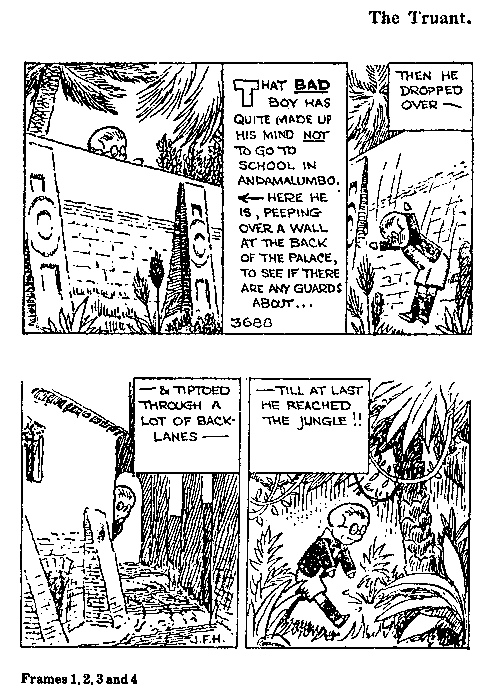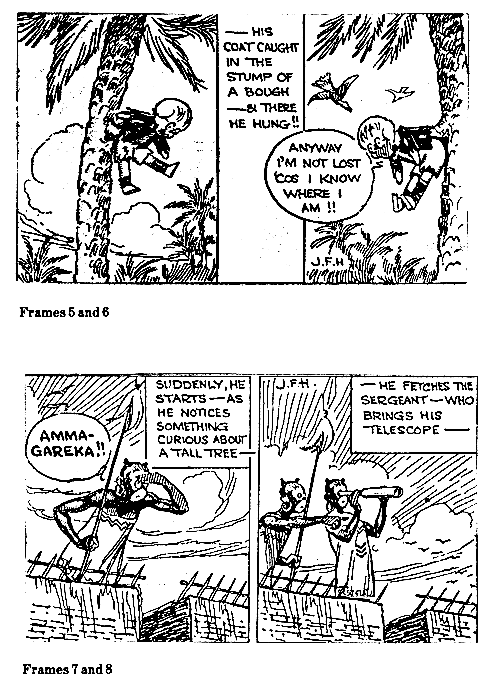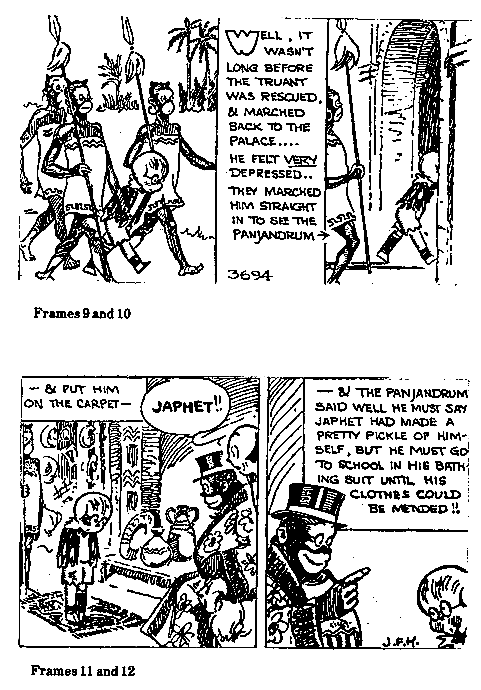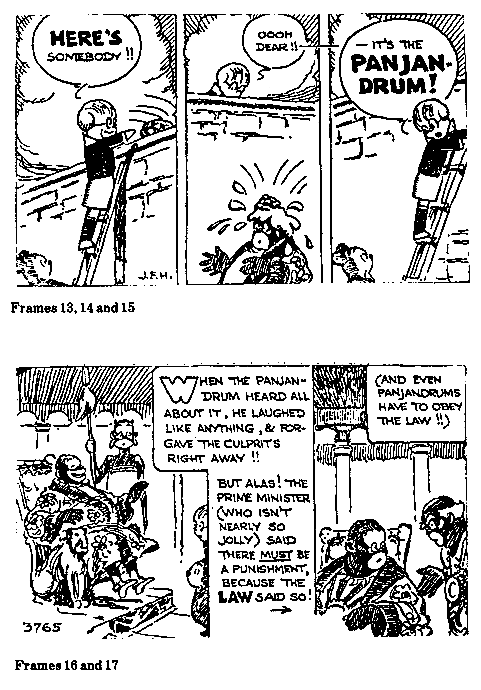A Source for Pratt's Truant?by Brian Trehearne E.J. Pratt's "The Truant" dramatizes the conflict between a mechanistic and immutable conception of the universe, and the "bucking" and indomitable human spirit. In a series of criminal charges, the man of free will is faced with the fact of his desertion from the "spiral festival of fire" presided over by the Panjandrum, an inherently stupid personification of physical and metaphysical conformism. Man's reply is a spirited and proud celebration of bravery and intelligence, in which he reduces the blinking Panjandrum to a series of synthetic concepts which have been abandoned by the simple turning of "a human page". Continuing with confidence from this initial overthrow, he identifies man's early mythologies and his precious science as mere "baby symbols to explain / The sunlight in Apollo's eyes", and predicts the ultimate humiliation of all the Panjandrum's system and presence. His voice then lifts to a bardic recollection of all the horrors of human history, and settles itself in a Christian roar of eternal defiance: "No! by the Rood, we will not join your ballet." This "little genus homer is Pratt's Truant". From the text he is only a truant in the older sense of the word, as provided by the Oxford English Dictionary: "a vagabond; an idle rogue or knave". It is important to realize that classroom imagery, which would give the word its more modern denotation, occurs only once in the poem ("our kindergarten show") and that so slight a reference, as to be overwhelmed by the constant allusions to systems of muds, mathematics and science. Put simply, the choice of the appellation "truant" makes little sense within the context of the poem. It borders on the intrusive, and may suggest an external inspiration. "The Truant" from all appearances takes its dramatic situation from a brief episode in a British children's comic strip (published in its annual form in the 1933 edition) entitled "The Noah Family". The proof is circumstantial but highly convincing. In the 1920's a series of children's dolls gained such immense popularity that they were given their own comic strip; this in turn did so well that colour annuals began to be published by the beginning of the 'thirties. These were written and illustrated by James Francis Horrabin, who had gained a reputation previously as the illustrator of atlases of social and political history. The annuals were called the "Japhet and Happy Annuals" (News Chronicle Publications Ltd., London, yearly), Japhet being a mischievous little boy and the principal character, and Happy, a small bear, his frequent companion. Their adventures form the bulk of the "Noah Family" cartoons. The Noah Family, prior to the 1933 edition, had acquired an affectionate relationship with the monarch of a fantastic third-world country named Andamalumbo. The name of this monarch is "the Panjandrum"; he is a portlyman, Negroid, flagrantly caricatured with thickening lips and bulging eyes. (The term "Panjandrum", incidentally, originated in some nonsense rhymes by Samuel Foote, English playwright, circa 1777, without meaning; but it was used in the 19th century to describe officious dignitaries whose self-respect extended well beyond their merits — OED.) This potentate has already waived all prerogatives of condescension and welcomes the Noah family as friends; indeed, the whole of the 1933 annual deals with one such visit to his kingdom. Japhet, the eldest son, is discouraged by his father's announcement that an extended stay in Andamalumbo will mean his return to the classroom; he instantly makes up his mind to sneak away from school, and spend the day as he likes. His first and second attempts fail, but his third forage leads him successfully into the jungle (Frames 1-4). His gay day of liberty backfires, however, and he undergoes some rather harrowing experiences, until at last he ends up hung upon a tree branch (Frames 5-6). Fortunately for the boy, a sentry spots him and "fetches the sergeant" (Frames 7-8) — note Pratt's sudden and unusual reference to the Panjandrum's "sergeant-major Fate" — and by these two he is led, not "bucking" but "very depressed" (Frames 9-10) before the great monarch. It is at this point that the cartoon's influence ends and Pratt's intentions take over. Unlike Pratt's protagonist, Japhet accepts his fate meekly, and the episode ends with order reestablished in his attendance at school (Frames 11-12). It is interesting that the Panjandrum of the cartoon is black, given Pratt's two references to his character's changes in facial colour: "And the great Panjandrum's face grew dark" and "The ALL HIGH swore until his face was black". Also, although the boy of the comic strip is transformed in the poem into a typical man of six feet, and turns from "six feet short" to "six feet high", he remains to the conclusion of the poem a "little fellow", a "little genus home". Can Pratt's truant be thought of as a mischievous boy? Another episode useful to these suggestions appears later in the same annual. Japhet and Happy have been indulging in a little cranial target practice with goloboshes (a prime Andamalumban fruit), and finally manage to recrown a surprised Panjandrum (Frames 13-15). Japhet is perhaps remembering his earlier trial for truancy when he and Happy flee and hide themselves; but Andamalumban tongues begin to wag until Japhet and Happy are discovered and marched back into the Panjandral presence. The introduction of a third figure, the Prime Minister (Frame 16-17) is of particular interest because of the curious figure of the "Master of the Revels" who leads Pratt's truant to Pratt's Panjandrum and describes his preliminary interrogations. Our cartoon Panjandrum is inclined to laugh the whole thing off; but his Prime Minister insists upon the letter of the law: note the parenthetical reference in the upper right hand of Frame 17: "And even Panjandrums have to obey the law." This notion, of a Panjandrum unable to dispute the mechanics of his own system, chimes perfectly with the corresponding theme in Pratt's poem; might it not have led him to thoughts of free will in the face of an unchangeable cosmic reality? Japhet is a non-conformist; despite his ultimate meekness in each case — these are, after all, children's books — he has broken the laws of the Andamalumban state, and has disputed the assumed authority in his fashion whenever faced with it.
Each cartoon page had a title. Given the evidence, we might now suggest that Pratt came across the title of Frames 1-4 — "The Truant" — before he wrote his elaborate defiance of unquestioned schemes and systems. The effect of such a conclusion is not earth-shaking; primarily it will remind us of those comic elements in his poem which may perhaps be glossed over or stripped of their delight if taken too seriously. When the "little genus homo" calls the Panjandrum a "dumb insouciant invertebrate", he is not only making an intellectualized statement based on observed fact, but is also taking a cheap shot. It is humourous, and should make us smile. Pratt's suggested delight in and reading of this "Japhet and Happy Annual" — and his subsequent development of a dramatic situation from it — should perhaps be remembered, therefore, when reading "The Truant". Without this comic source in mind, his "high seriousness" could become "over-seriousness", and the burden of his idea overwhelm the delight of his Situation. New sense is thus given to particular lines. Allusions such as "our Kindergarten show", "perambulated you through prisms", and "to pull our kiddy cars of inverse squares" stand out more boldly, and one is led to wonder what role childhood (as symbol) might play in the dispute. Ironically, Pratt's Truant, with these phrases, associates the Panjandrum with childhood, although little himself; perhaps some distinction ought to be made, then, between childhood and immaturity. These remarks, which a child-like sense may add to an interpretation of "The Truant", may be slight; but they at least bring to the work some of that original pleasure which Pratt must have felt in the sheer, dumbfounding size of the question — and of the Panjandrum; and perhaps, too, a touch of his own thrill of pride at the beaten broken boy who will never perjure his beliefs. |



